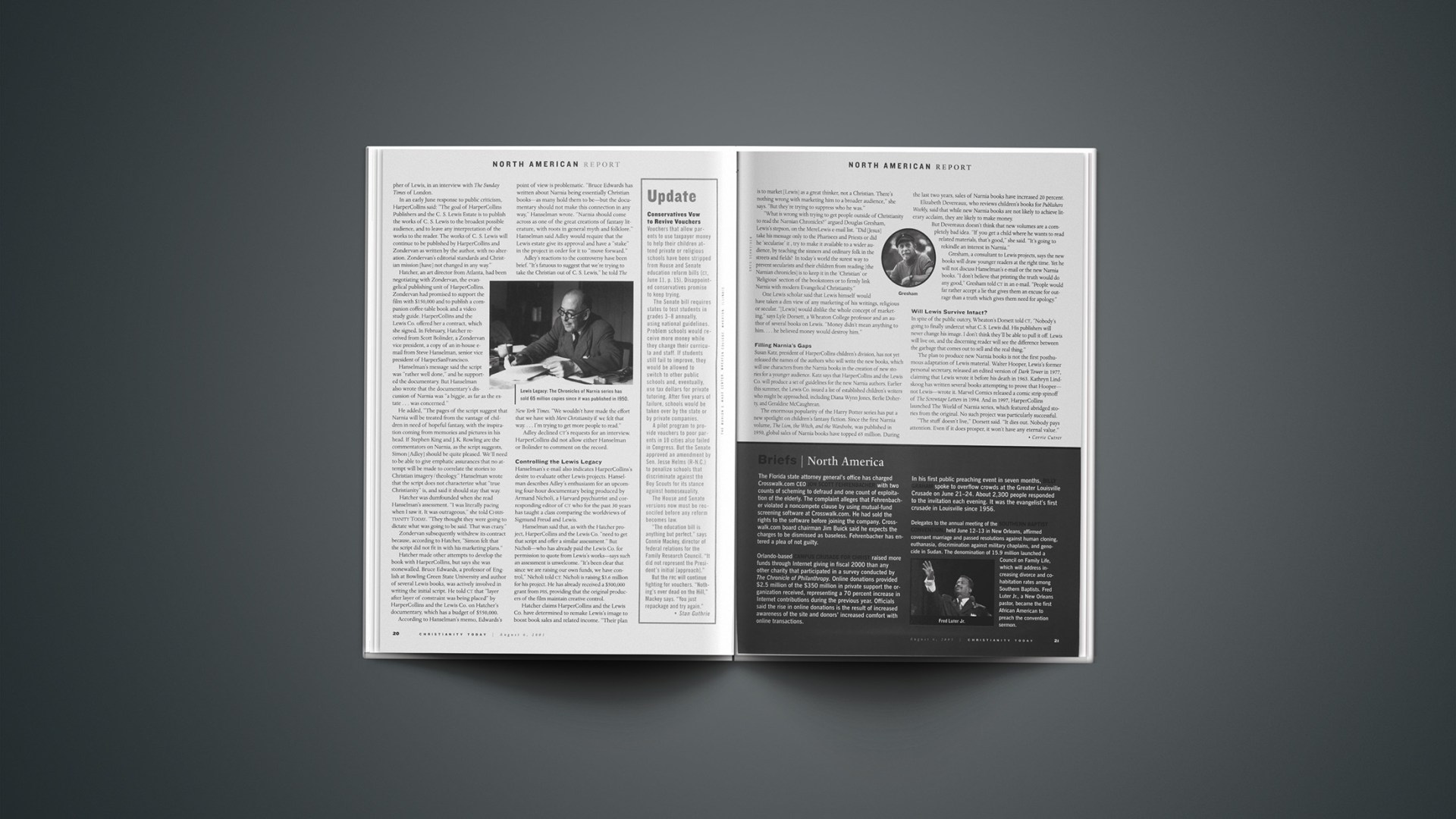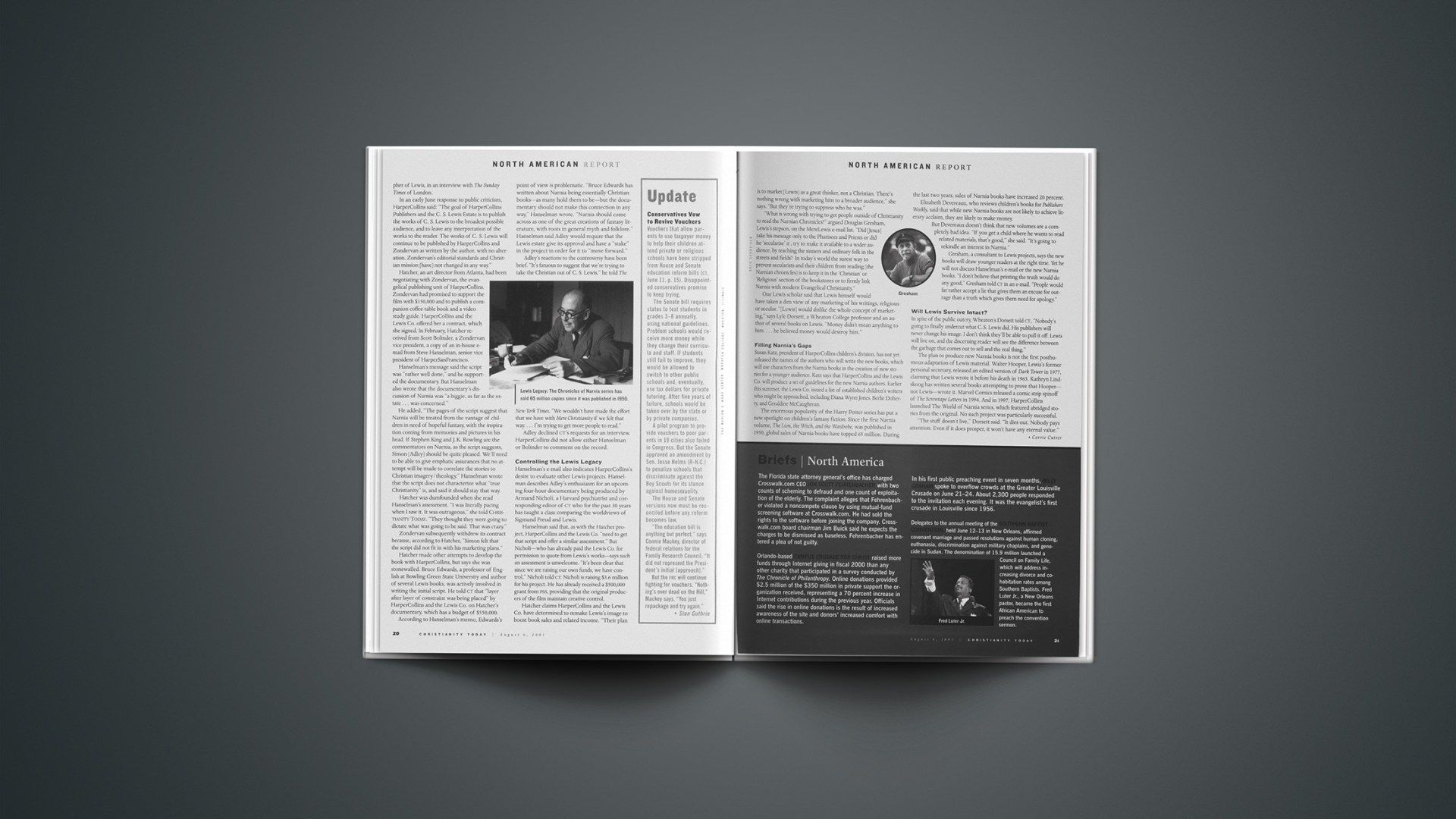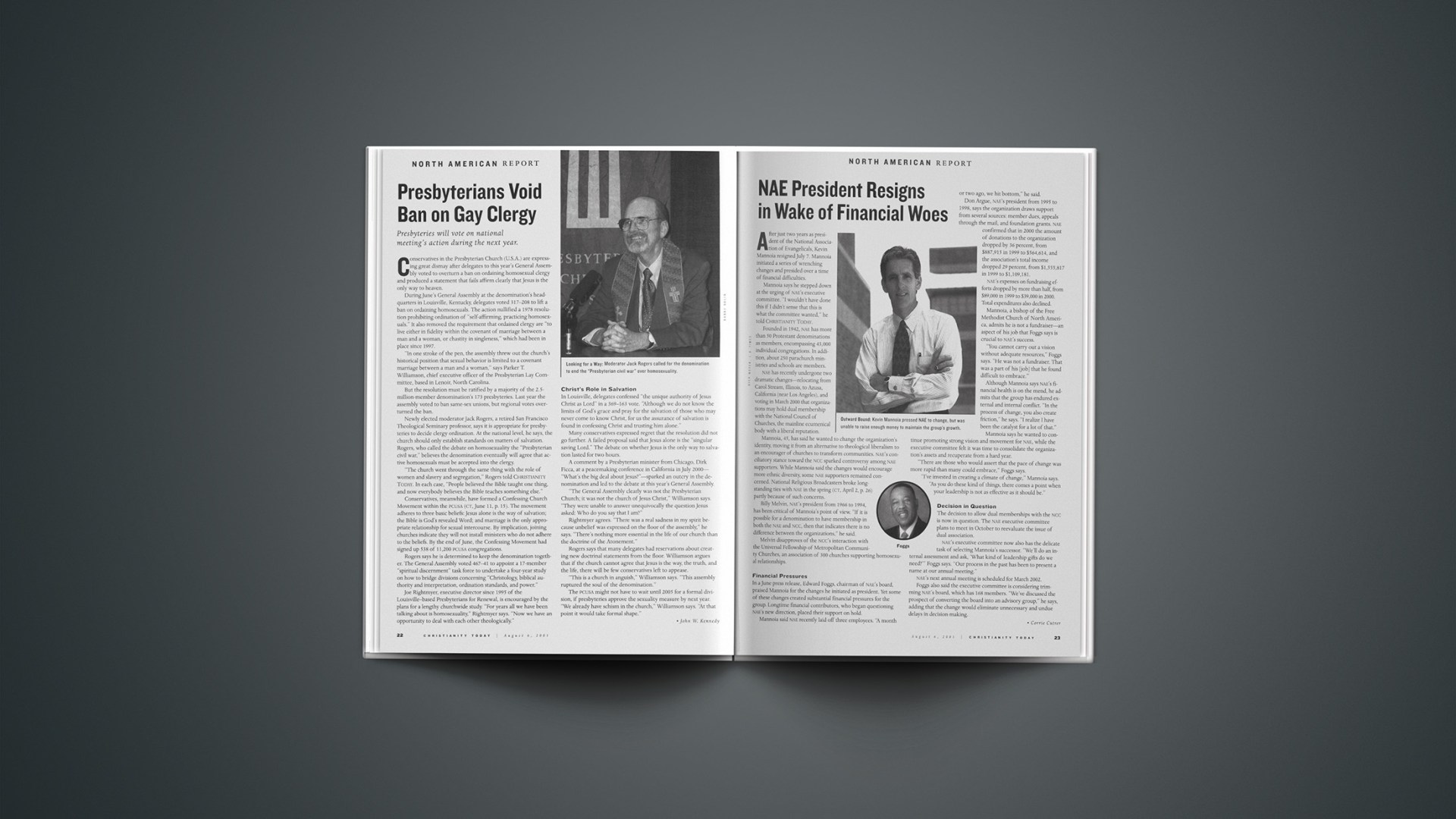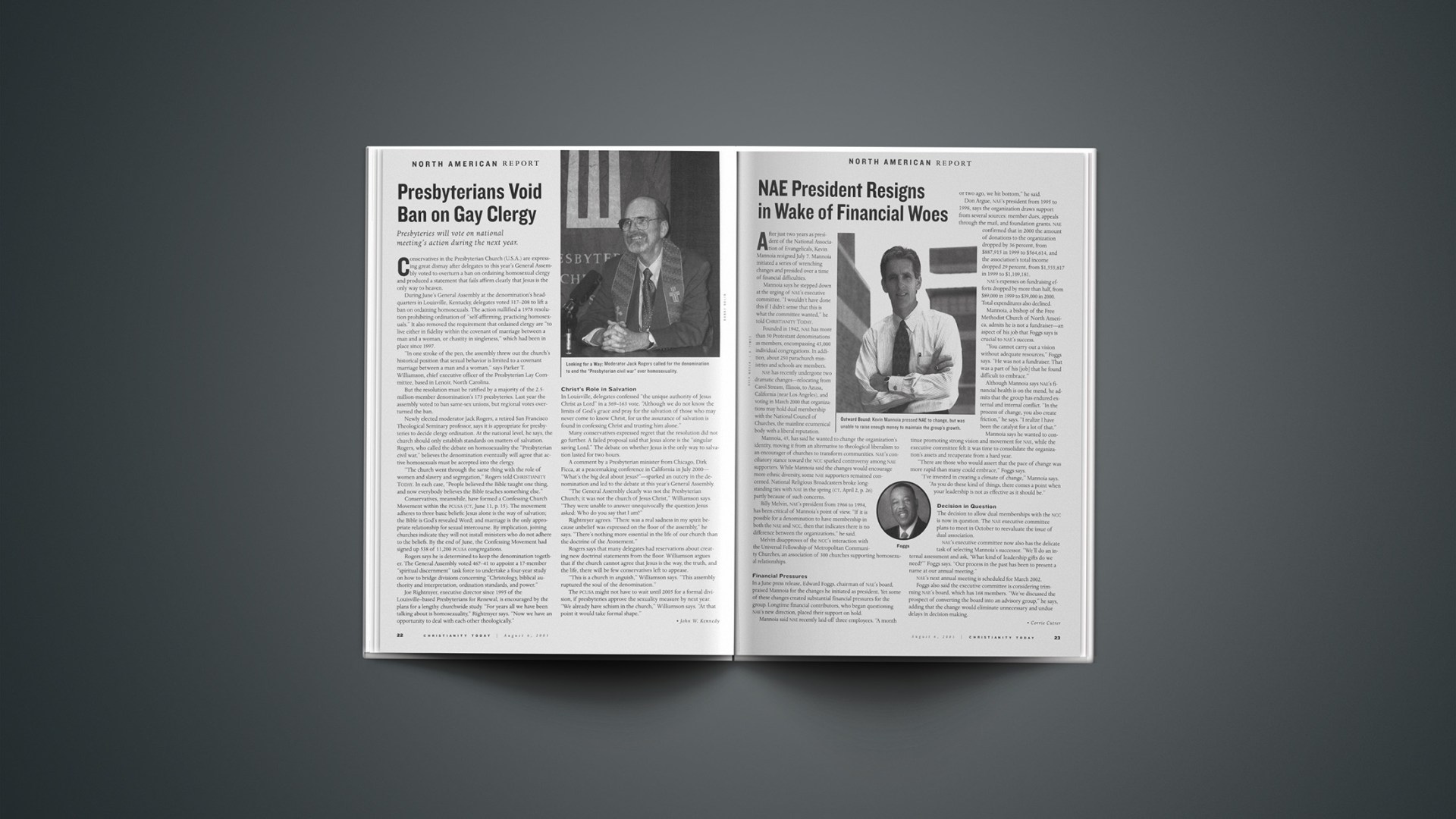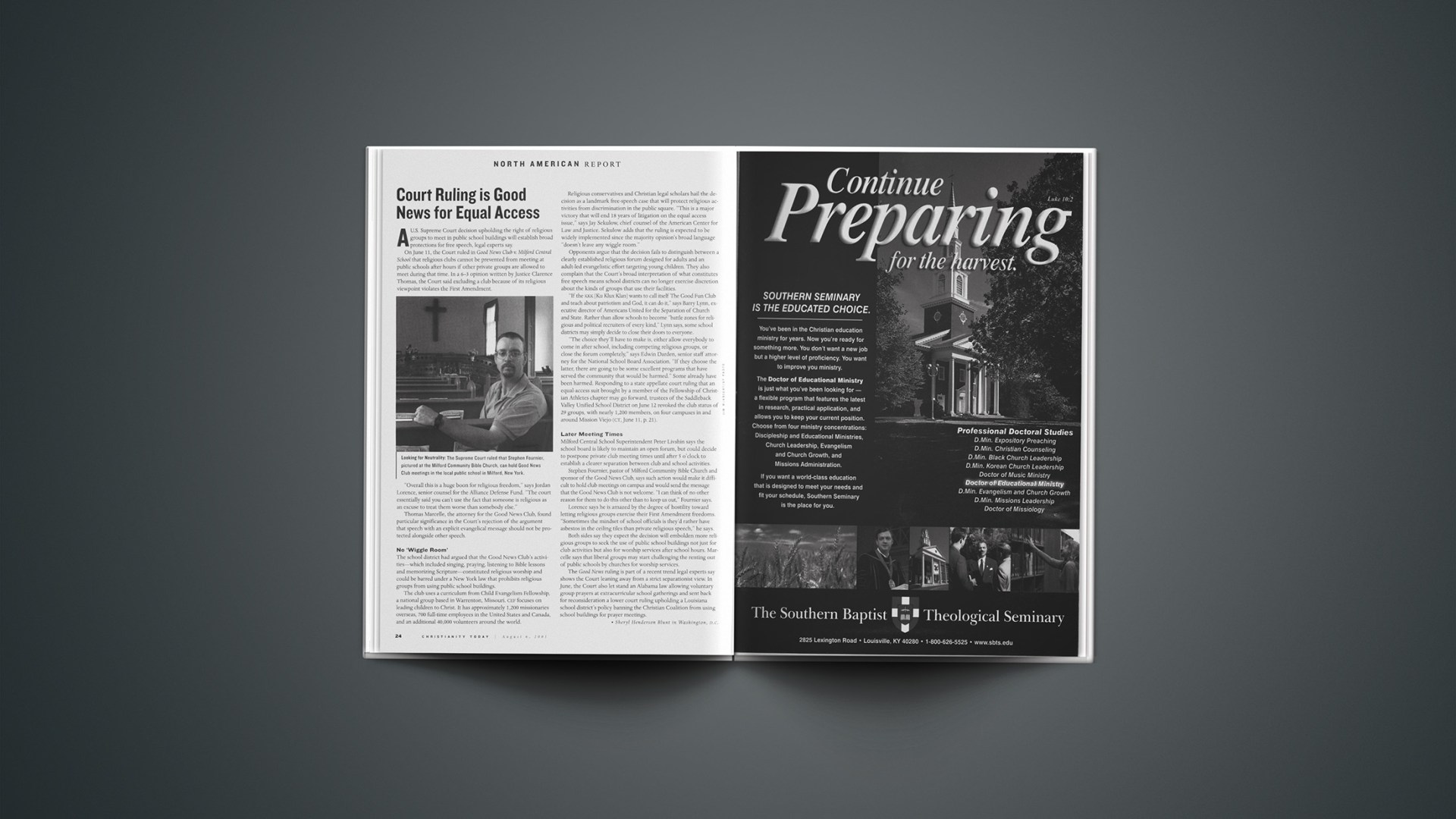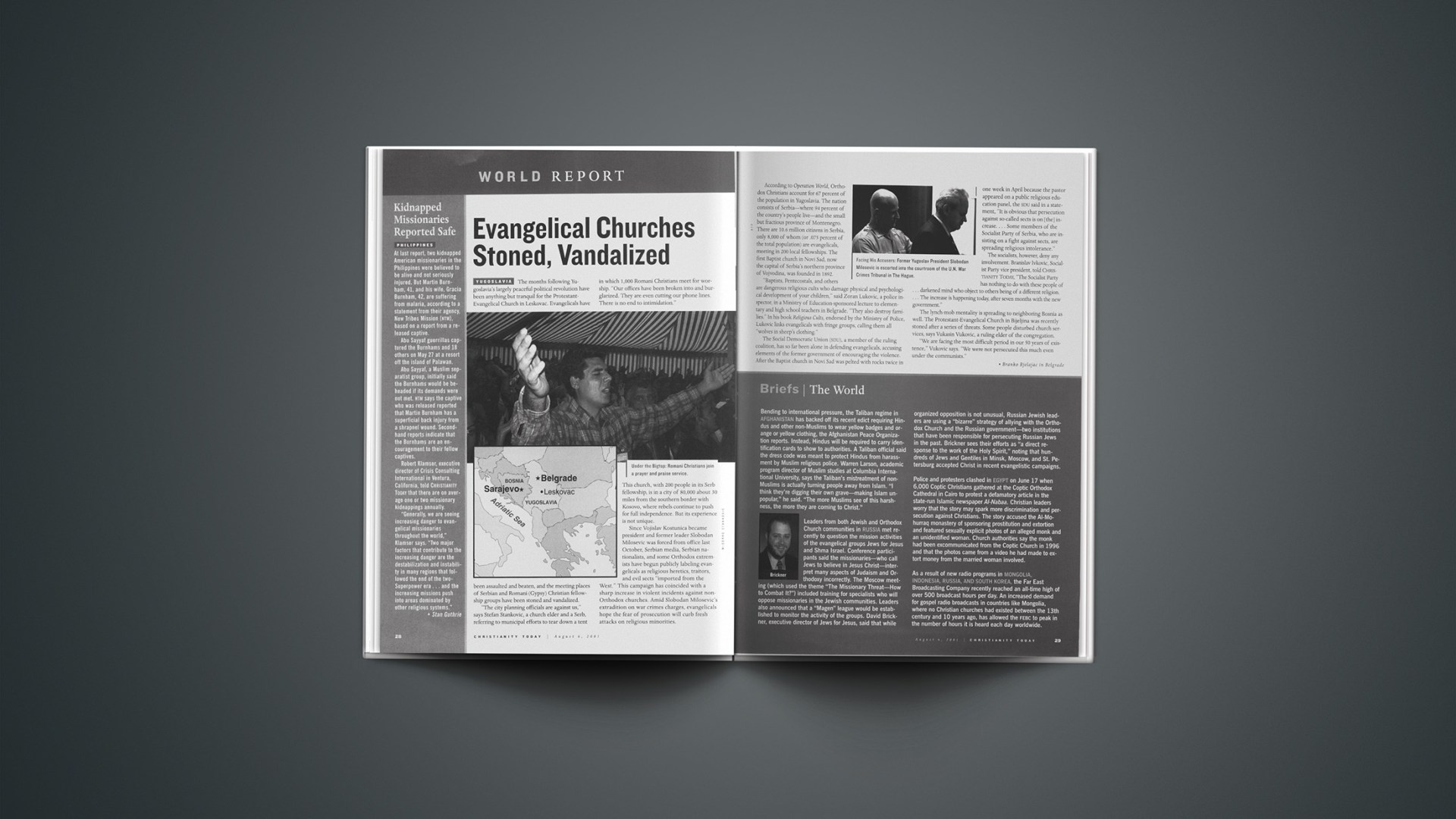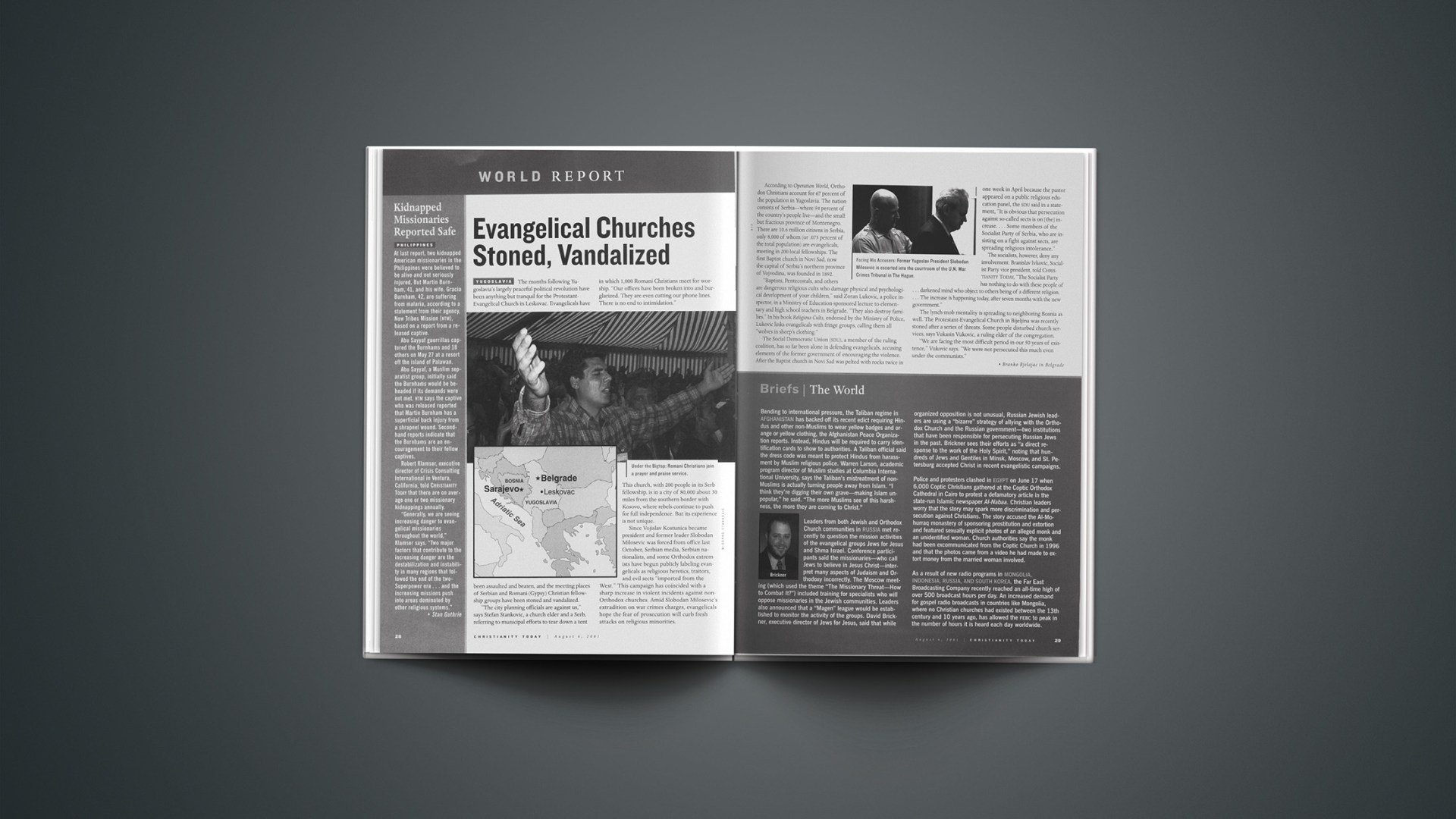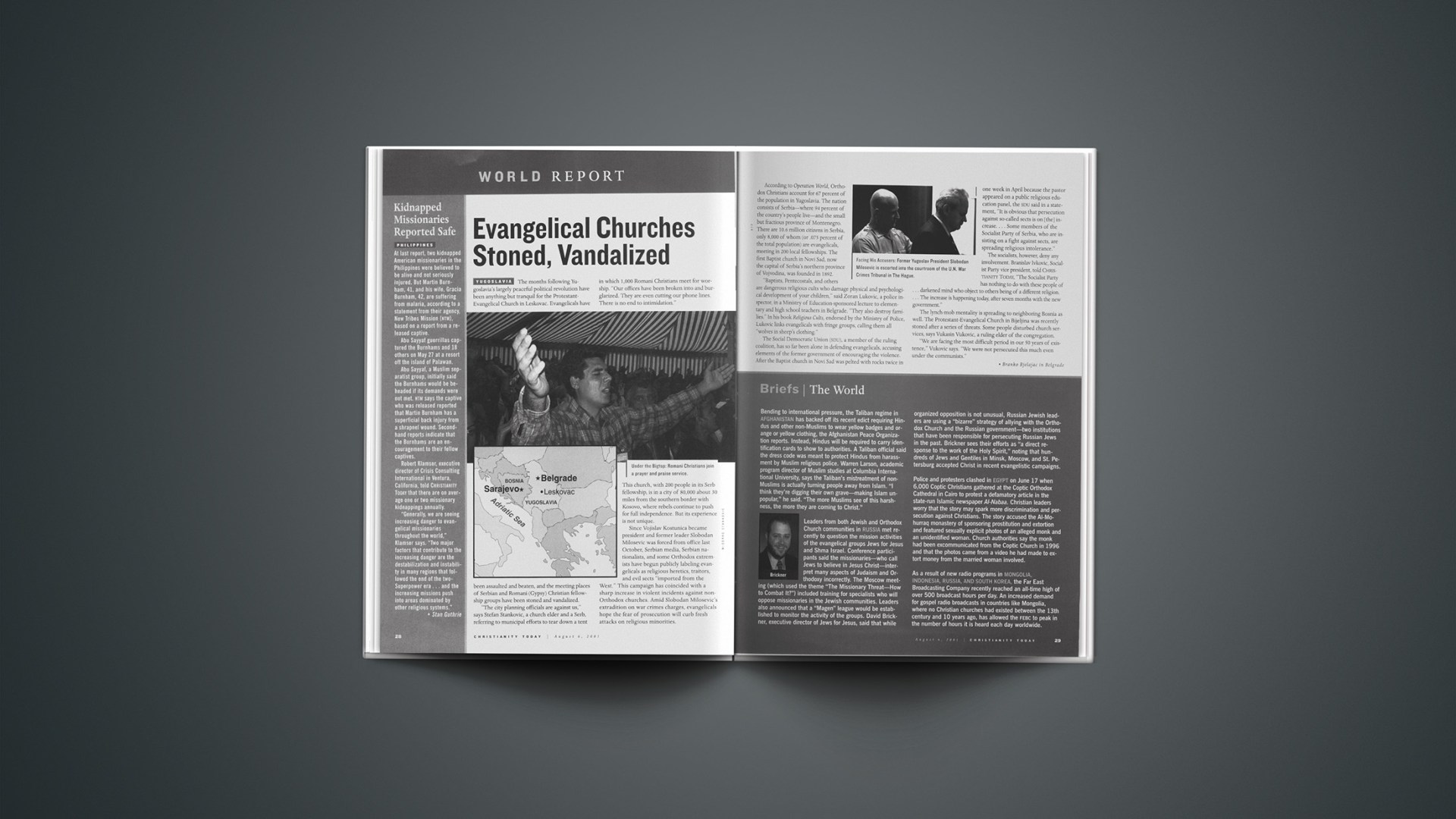In The Last Battle, the apocalyptic conclusion to C. S. Lewis's fantasy series The Chronicles of Narnia, humans, talking animals, and mythological creatures fight to restore Narnia and its lion-king Aslan, the central Christ figure.
Now a different battle is unfolding, one focused on Lewis's identity as perhaps the 20th century's preeminent literary apologist for Christianity.
Few noticed in March when HarperCollins announced its exclusive and potentially lucrative worldwide deal with the C. S. Lewis Co. in the United Kingdom (which holds the Lewis copyrights) to publish the works of Lewis in English. HarperCollins also announced plans to repackage Lewis's theological works, and to commission new Narnia picture books for preschoolers.
But several months ago Simon Adley, director of the Lewis Co., leaned on his new publishing partners to void a book deal in conjunction with a Lewis documentary because its script overemphasized Lewis's Christianity, according to documentary producer Carol Hatcher. An international controversy ensued, sparked by a front-page New York Times article headlined "Marketing Narnia Without a Christian Lion."
Much of the debate was ill-informed. Some Lewis fans and public commentators, including sociologist Andrew Greeley, misconstrued statements about HarperCollins's plan to market Lewis in a broad manner as a plan to de-Christianize the existing Narnia books.
"Plans are afoot to purge Christian content from the seven Narnia stories," Greeley wrote in mid-June. "Harper intends to censor out of C. S. Lewis' masterpiece that which is not most essential to it—its Christian imagery."
On the Internet, emotions of Lewis fans have run hot. One writer commented, "The Chronicles of Narnia are a work of art and having new stories written without the Christian theology that C.S. Lewis wove into the series is shameful."
Other criticism focused on the creation of new Narnia books. "It's ridiculous and I'm sure Lewis would have thought so, too," said A. N. Wilson, a biographer of Lewis, in an interview with The Sunday Times of London.
In an early June response to public criticism, HarperCollins said: "The goal of HarperCollins Publishers and the C. S. Lewis Estate is to publish the works of C. S. Lewis to the broadest possible audience, and to leave any interpretation of the works to the reader. The works of C. S. Lewis will continue to be published by HarperCollins and Zondervan as written by the author, with no alteration. Zondervan's editorial standards and Christian mission [have] not changed in any way."
Hatcher, an art director from Atlanta, had been negotiating with Zondervan, the evangelical publishing unit of HarperCollins. Zondervan had promised to support the film with $150,000 and to publish a companion coffee-table book and a video study guide. HarperCollins and the Lewis Co. offered her a contract, which she signed. In February, Hatcher received from Scott Bolinder, a Zondervan vice president, a copy of an in-house e-mail from Steve Hanselman, senior vice president of HarperSanFrancisco.
Hanselman's message said the script was "rather well done," and he supported the documentary. But Hanselman also wrote that the documentary's discussion of Narnia was "a biggie, as far as the estate. … was concerned."
He added, "The pages of the script suggest that Narnia will be treated from the vantage of children in need of hopeful fantasy, with the inspiration coming from memories and pictures in his head. If Stephen King and J. K. Rowling are the commentators on Narnia, as the script suggests, Simon [Adley] should be quite pleased. We'll need to be able to give emphatic assurances that no attempt will be made to correlate the stories to Christian imagery/theology." Hanselman wrote that the script does not characterize what "true Christianity" is, and said it should stay that way.
Hatcher was dumfounded when she read Hanselman's assessment. "I was literally pacing when I saw it. It was outrageous," she told Christianity Today. "They thought they were going to dictate what was going to be said. That was crazy."
Zondervan subsequently withdrew its contract because, according to Hatcher, "Simon felt that the script did not fit in with his marketing plans."
Hatcher made other attempts to develop the book with HarperCollins, but says she was stonewalled. Bruce Edwards, a professor of English at Bowling Green State University and author of several Lewis books, was actively involved in writing the initial script. He told CT that "layer after layer of constraint was being placed" by HarperCollins and the Lewis Co. on Hatcher's documentary, which has a budget of $550,000.
According to Hanselman's memo, Edwards's point of view is problematic. "Bruce Edwards has written about Narnia being essentially Christian books—as many hold them to be—but the documentary should not make this connection in any way," Hanselman wrote. "Narnia should come across as one of the great creations of fantasy literature, with roots in general myth and folklore." Hanselman said Adley would require that the Lewis estate give its approval and have a "stake" in the project in order for it to "move forward."
Adley's reactions to the controversy have been brief. "It's fatuous to suggest that we're trying to take the Christian out of C. S. Lewis," he told The New York Times. "We wouldn't have made the effort that we have with Mere Christianity if we felt that way. … I'm trying to get more people to read."
Adley declined CT's requests for an interview. HarperCollins did not allow either Hanselman or Bolinder to comment on the record.
Controlling the Lewis Legacy
Hanselman's e-mail also indicates HarperCollins's desire to evaluate other Lewis projects. Hanselman describes Adley's enthusiasm for an upcoming four-hour documentary being produced by Armand Nicholi, a Harvard psychiatrist and corresponding editor of CT who for the past 30 years has taught a class comparing the worldviews of Sigmund Freud and Lewis.
Hanselman said that, as with the Hatcher project, HarperCollins and the Lewis Co. "need to get that script and offer a similar assessment." But Nicholi—who has already paid the Lewis Co. for permission to quote from Lewis's works—says such an assessment is unwelcome. "It's been clear that since we are raising our own funds, we have control," Nicholi told CT. Nicholi is raising $3.6 million for his project. He has already received a $500,000 grant from pbs, providing that the original producers of the film maintain creative control.
Hatcher claims HarperCollins and the Lewis Co. have determined to remake Lewis's image to boost book sales and related income. "Their plan is to market [Lewis] as a great thinker, not a Christian. There's nothing wrong with marketing him to a broader audience," she says. "But they're trying to suppress who he was."
"What is wrong with trying to get people outside of Christianity to read the Narnian Chronicles?" argued Douglas Gresham, Lewis's stepson, on the MereLewis e-mail list. "Did [Jesus] take his message only to the Pharisees and Priests or did he 'secularise' it , try to make it available to a wider audience, by teaching the sinners and ordinary folk in the streets and fields? In today's world the surest way to prevent secularists and their children from reading [the Narnian chronicles] is to keep it in the 'Christian' or 'Religious' section of the bookstores or to firmly link Narnia with modern Evangelical Christianity."
One Lewis scholar said that Lewis himself would have taken a dim view of any marketing of his writings, religious or secular. "[Lewis] would dislike the whole concept of marketing," says Lyle Dorsett, a Wheaton College professor and an author of several books on Lewis. "Money didn't mean anything to him. … he believed money would destroy him."
Filling Narnia's Gaps
Susan Katz, president of HarperCollins children's division, has not yet released the names of the authors who will write the new books, which will use characters from the Narnia books in the creation of new stories for a younger audience. Katz says that HarperCollins and the Lewis Co. will produce a set of guidelines for the new Narnia authors. Earlier this summer, the Lewis Co. issued a list of established children's writers who might be approached, including Diana Wynn Jones, Berlie Doherty, and Geraldine McCaughrean.
The enormous popularity of the Harry Potter series has put a new spotlight on children's fantasy fiction. Since the first Narnia volume, The Lion, the Witch, and the Wardrobe, was published in 1950, global sales of Narnia books have topped 65 million. During the last two years, sales of Narnia books have increased 20 percent.
Elizabeth Devereaux, who reviews children's books for Publishers Weekly, said that while new Narnia books are not likely to achieve literary acclaim, they are likely to make money.
But Devereaux doesn't think that new volumes are a completely bad idea. "If you get a child where he wants to read related materials, that's good," she said. "It's going to rekindle an interest in Narnia."
Gresham, a consultant to Lewis projects, says the new books will draw younger readers at the right time. Yet he will not discuss Hanselman's e-mail or the new Narnia books. "I don't believe that printing the truth would do any good," Gresham told CT in an e-mail. "People would far rather accept a lie that gives them an excuse for outrage than a truth which gives them need for apology."
Will Lewis Survive Intact?
In spite of the public outcry, Wheaton's Dorsett told CT, "Nobody's going to finally undercut what C. S. Lewis did. His publishers will never change his image. I don't think they'll be able to pull it off. Lewis will live on, and the discerning reader will see the difference between the garbage that comes out to sell and the real thing."
The plan to produce new Narnia books is not the first posthumous adaptation of Lewis material. Walter Hooper, Lewis's former personal secretary, released an edited version of Dark Tower in 1977, claiming that Lewis wrote it before his death in 1963. Kathryn Lindskoog has written several books attempting to prove that Hooper—not Lewis—wrote it. Marvel Comics released a comic strip spinoff of The Screwtape Letters in 1994. And in 1997, HarperCollins launched The World of Narnia series, which featured abridged stories from the original. No such project was particularly successful.
"The stuff doesn't live," Dorsett said. "It dies out. Nobody pays attention. Even if it does prosper, it won't have any eternal value."
Copyright © 2001 Christianity Today. Click for reprint information.
Related Elsewhere:
Also appearing on our site today is a Christianity Today editorial, Aslan is Still on the Move.
News about the new Narnia books was first reported by The Sunday Times of London.
The New York Times heated up the Narnia controversy by publishing parts of a leaked HarperSanFrancisco memo.
Additional media coverage included USA Today, The National Post, World,The BBC, and The Telegraph.
Christianity Today's Weblog covered the C.S. Lewis debate extensively:
Missionary Pilot Reportedly Off the Hook in Investigation of Peru Plane Shooting | Plus: Deadly church vans, more Narnia wars, and other stories from media sources around the world. (July 20, 2001)
The War for C.S. Lewis: The Prequel | Plus: Gabriel's blessing for the Guthrie family. (July 17, 2001)
The War for Narnia Continues | Charles Colson, Andrew Greeley, Frederica Mathewes-Green, and Lauren Winner join the battle—and Doug Gresham comes out to reply. (June 20, 2001)
Grief Observed Over Abolition of Lewis's Mere Christianity | Plus: Supreme Court okays Christian elementary school club, and American missionaries are still alive. (June 11, 2001)
God Banned from Narnia | Plus: Missionaries still held by terrorists despite military attack and other stories from mainstream media around the world. (June 4, 2001)
Narnia Will Return In New Books | As all of the Inklings' publishers await record interest, HarperCollins seeks to "fill in the gaps" beyond the wardrobe. (May 15, 2001)
Washington Post Covers North Korea's Persecution of Christians | Plus: Missionaries to United Arab Emirates deported, and HarperCollins's C.S. Lewis deal. (April 10, 2001)
Christianity Today sister publication Books and Culture recently looked at C. S. Lewis among the postmodernists.
Christian History, another Christianity Today sister publication, profiled Lewis for its issue on "The 10 Most Influential Christians of the Twentieth Century."
If it's Lewis you're interested in, Into the Wardrobe should fill your every desire.
Beliefnet also has a series of Lewis-centric articles, including a C.S. Lewis essay contest.
The Discovery Institute's C.S. Lewis and Public Life site is another wonderful resource of papers about and by Lewis.
Still hungry for more? You'll probably never have the time to read everything linked at the C.S. Lewis Mega-Links page.
Previous Christianity Today articles on C.S. Lewis include:
Myth Matters | C. S. Lewis bequeathed us a method and a language for sharing the gospel with the modern and postmodern world. (April 17, 2001)
Walking Where Lewis Walked | My reluctant entry into the world of pilgrimage. (Feb. 7, 2000)
Still Surprised by Lewis | Why this nonevangelical Oxford don has become our patron saint" (Sept. 7, 1998)
Jack Is Back | The search for the historical Lewis (Feb. 3, 1997)




